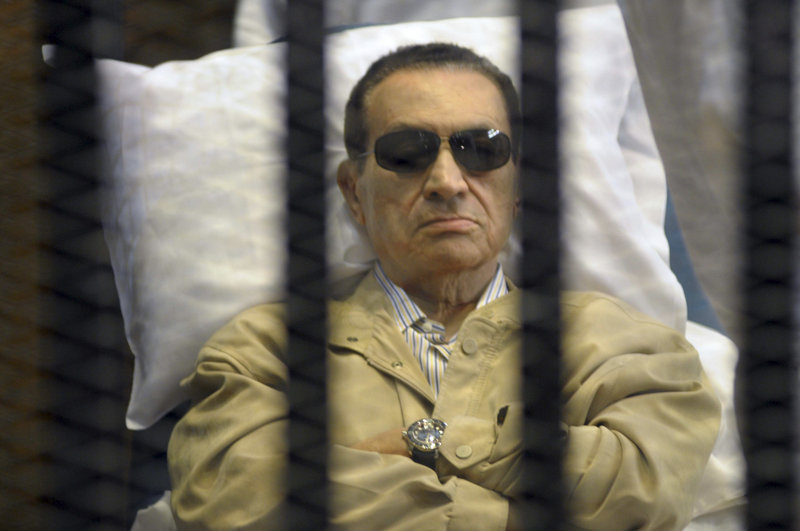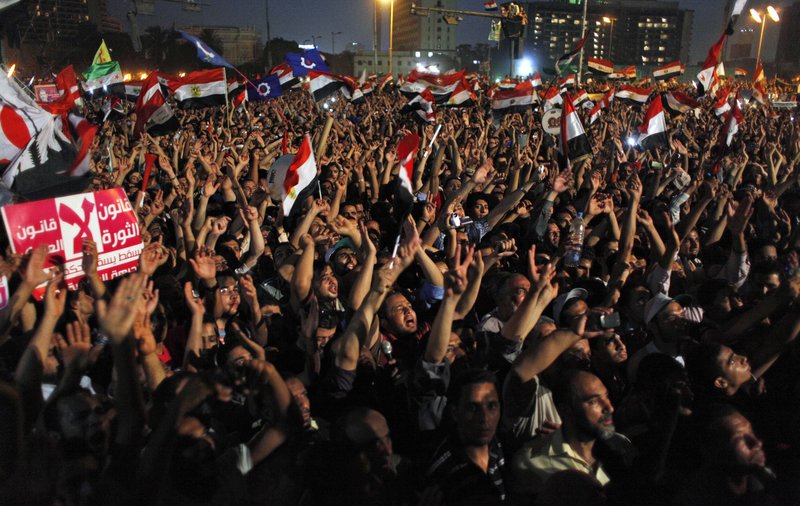CAIRO — Egypt’s Hosni Mubarak was on life support after suffering a stroke in prison Tuesday, deepening the country’s uncertainty just as a potentially explosive fight opened over who will succeed him.
Mubarak, 84, suffered a “fast deterioration of his health” and his heart stopped beating, the state news agency MENA and security officials said. He was revived by defibrillation but then had a stroke and was moved from Torah Prison to a military hospital in Cairo.
MENA initially reported he was “clinically dead” upon arrival, but a security official said he was put on life support. The official spoke on condition of anonymity because he was not authorized to speak to the media.
Maj. Gen. Mohsen el-Fangari, a member of the ruling military council, told the Al-Shorouk newspaper website that Mubarak was in a “very critical condition,” but denied he was dead. Mubarak’s wife, Suzanne, came to the hospital, where Mubarak was in an intensive care unit, another security official said.
The developments came amid threats of new unrest and political power struggles, 16 months after Mubarak was ousted by a popular uprising demanding democracy.
Earlier Tuesday, both candidates in last weekend’s presidential election claimed victory.
The Muslim Brotherhood, emboldened by its claim that its candidate won the election, sent tens of thousands of supporters into the street in an escalation of its confrontation against the ruling generals who invoked sweeping powers this week that give them dominance over the next president.
Some 50,000 protesters, mostly Islamists, protested in Cairo’s Tahrir Square, chanting slogans in support of Brotherhood candidate Mohammed Morsi and denouncing the generals.
“It is not possible to have a revolution and then have military rule and a president with no authority,” said protester Mohammed Abdel-Hameed, a 48-year-old schoolmaster who came with his son from Fayyoum, an oasis province 60 miles southwest of Cairo.
The conflicting claims over the election could further stoke the heat. The campaign of Mubarak’s former prime minister, Ahmed Shafiq, said Tuesday he won the election, denying the Brotherhood’s claim of victory. Hundreds of Shafiq’s supporters took to the streets in Cairo in celebration.
The election commission is to announce the official final results Thursday, and either way the loser is likely to reject the result. If Shafiq wins, it could spark an explosive backlash from the Brotherhood, which has said Shafiq could win only by fraud.
SKEPTICISM OVER SUDDEN HEALTH CRISIS
The sudden health crisis of Mubarak, who is serving a life prison term, briefly overshadowed the political standoff.
Moving Mubarak out of prison to Maadi military hospital is likely to further infuriate many in the public. Many Egyptians have been skeptical of earlier reports that his health was worsening since he was put in prison June 2, believing the reports were just a pretext to move him to another facility.
There is a widespread suspicion that security and military officials sympathetic to their old boss are giving him preferential treatment.
The criteria for using the term “clinically dead” are “poorly defined,” said Dr. Lance Becker, a University of Pennsylvania emergency medicine specialist and an American Heart Association spokesman.
“My speculation would be that he had that sort of event where his heart temporarily stopped,” said Becker, who is not involved in Mubarak’s treatment. “That doesn’t mean that it’s irreversible.” Life support can be used to circulate his blood and replace breathing if he is unable to do so on his own, Becker said.
Mubarak has been serving a life sentence at Torah Prison for failing to stop the killing of protesters during the 18-day uprising against his rule last year.
EACH CANDIDATE CLAIMS VICTORY
The multiple disputes have turned a moment that was once anticipated by some as a landmark in Egypt’s post-Mubarak transition — the election of the first civilian president in 60 years — into a potentially destabilizing snarl.
Shafiq’s campaign spokesman, Ahmed Sarhan, told a televised news conference that Shafiq won 51.5 percent of the vote and that the claim of victory by Morsi was “false.”
“Gen. Ahmed Shafiq is the next president of Egypt,” Sarhan said. He said Shafiq won some 500,000 votes more than Morsi, of the fundamentalist Brotherhood.
The Shafiq campaign’s claim came just hours after Morsi’s campaign repeated their claims of victory, saying Morsi had won 52 percent of the vote compared to Shafiq’s 48.
The Brotherhood first announced Morsi’s victory early Monday, six hours after polls closed. It said its claim was based on returns announced by election officials from each counting center around the country. Each campaign has representatives at every center, who compile the individual returns. The Brotherhood’s compilation during the first round of voting last month proved generally accurate.
Shafiq, a former air force commander who was named prime minister during Mubarak’s last days, is seen by his opponents as likely to ensure that Egypt remains a military-backed police state. He, in turn, has presented himself as a strongman able to keep Egypt stable and out of the hands of the Brotherhood, playing on fears the group will turn the country into an Islamic state.
As polls closed Sunday night, the military – which has ruled since Mubarak fell on Feb. 11, 2011 – issued a constitutional declaration giving themselves power that all but subordinates the new president. Critics said it’s a coup intended to maintain their control over the state even after they nominally transfer authorities to the president by July 1.
The declaration gave the generals legislative powers and control over the process of drafting a new constitution and the national budget. It also shields the military against any kind of civilian oversight and allows the generals to run their own affairs without interference from civilian authorities.
A court ruling also dissolved the Islamist-dominated parliament last week, a verdict that has been endorsed by a decree issued by military ruler Field Marshal Hussein Tantawi.
The Brotherhood and its Islamist allies rejected the dissolution decree and insisted the parliament is still in effect.
Send questions/comments to the editors.




Success. Please wait for the page to reload. If the page does not reload within 5 seconds, please refresh the page.
Enter your email and password to access comments.
Hi, to comment on stories you must . This profile is in addition to your subscription and website login.
Already have a commenting profile? .
Invalid username/password.
Please check your email to confirm and complete your registration.
Only subscribers are eligible to post comments. Please subscribe or login first for digital access. Here’s why.
Use the form below to reset your password. When you've submitted your account email, we will send an email with a reset code.